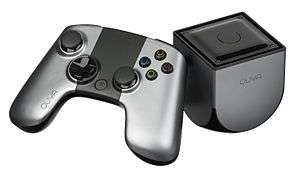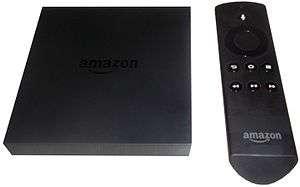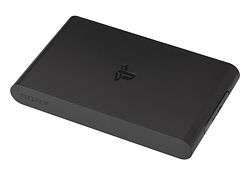Microconsole
A microconsole is a small video game console. Many of them are low-cost Android-based devices that connect to a television set. One can then use the television to play video games downloaded from an application store, such as Google Play.

Origins
In late 2010, cloud gaming startup OnLive released MicroConsole, a television adapter and wireless controller that connects the company's computer game streaming service to televisions.[1] VentureBeat's Dean Takahashi described the device as representing the company founder's "vision to turn the video game industry upside down" as an inexpensive console providing "high-end games on low-end hardware" that could eliminate the cycle of regular consumer hardware upgrades.[2][3] The MicroConsole TV adapter was produced at a loss.[3] OnLive's MicroConsole made the company an early leader in the nascent microconsole field.[4]
Amidst a "new war for TV" in the consumer electronics industry,[5] an inexpensive and simple Android-based video game console designed for televisions called Ouya was announced for crowdfunding in July 2012. The Ouya was an overnight success and raised $8.5 million.[6][7] Significant interest in low-cost Android console gaming followed Ouya's success,[8][9][10] spurred by the mobile games industry growth.[4][11] The industry began to refer to the resulting consoles as alternative consoles, or microconsoles.[12]
Polygon reported that Android "consoles" were best-in-show at the January 2013 Consumer Electronics Show, citing devices like the MOGA Pro, Green Throttle Games Atlas controller, Nvidia Shield, and news of Valve's Steam Machine, a non-Android console.[13][9][14] Following Ouya's success, other similar set-top Android gaming devices were announced as direct competitors, including the GameStick in early 2013,[15][16][17] GamePop in May 2013,[18] and Mad Catz's MOJO in June 2013.[19] Forbes's Daniel Nye Griffiths referred to Ouya and GameStick's close release dates as the microconsole field's first "showdown".[4] The GamePop and MOJO announcements in the early summer referred to the devices as "microconsoles".[20][21]
The PlayStation TV (known in Asia as the PlayStation Vita TV) is a microconsole announced in September 2013 at a Sony Computer Entertainment Japan presentation.[22][23][24] It was released in Japan on November 14, 2013 and in North America on October 14, 2014.
Reception
Gamasutra called Ouya, GameStick, and GamePop "console alternatives" that represent "a potential new market space for developers".[25] Tadhg Kelly, writing for Edge, called 2013 "the year of the microconsole", citing less consumer need for traditional console power, the low price of microconsole manufacture, increased system compatibility for easier game development, and more developer freedom from console business interests.[26] Microconsole promises of a less restrictive platform are expected to empower independent game developers.[14][27] Kelly referred to the "deliberately small" microconsoles as "the netbooks of the console world", not intended to compete with big video game consoles.[28] Other reviewers called the microconsoles competitors, though not a threat, and referred to a crowded "non-traditional console space" as a disadvantage.[10] Kelly added that Ouya is heavily focused on the early adopter audience and its interests, and that Ouya's "natural advantage" of price has not been communicated effectively.[28] Edge questioned possibilities of microconsole success due to competition within the field as well as from Nintendo, Sony, and Microsoft's new consoles.[29]
The pre-release Ouya was panned by early reviewers.[30] The Verge called it unfinished,[31] and in a later review, Eurogamer questioned why consumers would purchase a console that duplicated the functionality of smartphones they already had.[6]
The video game industry saw the digital media receiver on Apple's Apple TV as potential microconsole competition due to the company's experience in the mobile games market.[32][33][28] Polygon reported in January 2013 that the Apple TV "continue[d] to be dangerously close to upending the mobile gaming space" and speculated that an Apple TV App Store could spark "a rush of games to the television".[13]
References
- Ackerman, Dan (November 17, 2010). "PC games come to TV with OnLive's MicroConsole". CNET. CBS Interactive. Archived from the original on June 8, 2013. Retrieved June 7, 2013.
- Takahashi, Dean (November 17, 2010). "OnLive starts pre-sales for MicroConsole aimed at eliminating game consoles". VentureBeat. Archived from the original on June 8, 2013. Retrieved June 7, 2013.
- Hollister, Sean (August 28, 2012). "OnLive lost: how the paradise of streaming games was undone by one man's ego". The Verge. Vox Media. Archived from the original on June 8, 2013. Retrieved June 7, 2013.
- Griffiths, Daniel Nye (May 9, 2013). "OUYA Closes $15 Million Round, Sets Up Microconsole Showdown". Forbes. Archived from the original on June 8, 2013. Retrieved June 7, 2013.
- Patel, Nilay (November 12, 2012). "Over the top: the new war for TV is just beginning". The Verge. Vox Media. Archived from the original on June 8, 2013. Retrieved June 8, 2013.
- McFerran, Damien (June 8, 2013). "Ouya review". Eurogamer. Gamer Network. Archived from the original on June 8, 2013. Retrieved June 8, 2013.
- Plunkett, Luke (August 9, 2012). "Ouya's Ridiculously Successful Kickstarter Ends With Millions in the Bank". Kotaku. Gawker Media. Archived from the original on June 8, 2013. Retrieved June 7, 2013.
- Gilbert, Ben (February 1, 2013). "OUYA developers sound off: successes and failures of the dev kit, one month out". Engadget. AOL Tech. Archived from the original on June 8, 2013. Retrieved June 7, 2013.
- Hollister, Sean (January 10, 2013). "Nvidia's Project Shield: right on time". The Verge. Vox Media. Archived from the original on June 8, 2013. Retrieved June 7, 2013.
- Thier, David (May 9, 2013). "There's A New, Free Console Competing With The Ouya". Forbes. Archived from the original on June 8, 2013. Retrieved June 8, 2013.
- McElroy, Griffin (November 6, 2012). "Guitar Hero co-creator developing virtual gaming console for smartphones and TVs". Polygon. Vox Media. Archived from the original on June 8, 2013. Retrieved June 8, 2013.
- Grubb, Jeffrey (May 30, 2013). "The console alternatives: Everything you need to know about Ouya, GameStick, and Shield". VentureBeat. Archived from the original on June 8, 2013. Retrieved June 8, 2013.
- Grant, Christopher (January 15, 2013). "Android 'consoles' and Steam Boxes dominate gaming at CES, while consoles sit it out". Polygon. Vox Media. Archived from the original on June 8, 2013. Retrieved June 7, 2013.
- Kelly, Tadhg (January 8, 2013). "2013: The year of the microconsole?". Gamasutra. UBM TechWeb. Archived from the original on June 8, 2013. Retrieved June 8, 2013.
- Etherington, Darrell (January 2, 2013). "GameStick Launches OUYA Competitor On Kickstarter, Aims To Be The First Pocketable Android Home Gaming Console". TechCrunch. AOL Tech. Archived from the original on June 8, 2013. Retrieved June 7, 2013.
- Hatfield, Don (January 2, 2013). "GameStick Android Console Aims To Be OUYA's First Competitor". MTV Geek. Viacom. Archived from the original on June 8, 2013. Retrieved June 7, 2013.
- Corriea, Alexa Ray (February 1, 2013). "GameStick ends Kickstarter campaign with just under $650K, meets all stretch goals". Polygon. Vox Media. Archived from the original on June 8, 2013. Retrieved June 7, 2013.
- Pitcher, Jenna (June 2, 2013). "GamePop Android microconsole launching in winter for $129, free with subscription". Polygon. Vox Media. Archived from the original on June 8, 2013. Retrieved June 7, 2013.
- Sarkar, Samit (June 7, 2013). "Mad Catz working on Project M.O.J.O. Android micro-console, showing it at E3". Polygon. Vox Media. Archived from the original on June 7, 2013. Retrieved June 7, 2013.
- Williams, Mike (May 10, 2013). "Bluestacks announces Android-powered Gamepop console". GamesIndustry. Gamer Network. Archived from the original on June 8, 2013. Retrieved June 7, 2013.
- Trew, James (June 7, 2013). "Mad Catz CEO announces 'Project M.O.J.O.' Android gaming console coming at E3". Engadget. AOL Tech. Archived from the original on June 8, 2013. Retrieved June 7, 2013.
- "Sony Announces $100 'PlayStation Vita TV' Micro-Console". Forbes. Retrieved 2013-10-02.
- Gilbert, Ben (2013-09-18). "Hands-on with the PlayStation Vita TV, Sony's $100 microconsole (update: video!)". Engadget.com. Retrieved 2013-10-02.
- "News: Sony announces PS Vita TV microconsole". ComputerAndVideoGames.com. 2013-09-09. Retrieved 2013-10-02.
- Ligman, Kris (May 9, 2013). "Ouya has a new competitor with subscription-based GamePop". Gamasutra. UBM TechWeb. Retrieved June 8, 2013.
- Kelly, Tadhg (March 14, 2013). "Why 2013 could be the year of the microconsole". Edge. Future Publishing. Archived from the original on June 8, 2013. Retrieved June 8, 2013.
- Luton, Will (May 21, 2013). "How I Stopped Worrying and Learned To Love The Microconsole". GamesIndustry. Gamer Network. Archived from the original on June 8, 2013. Retrieved June 8, 2013.
- Kelly, Tadhg (April 6, 2013). "What Games Are: The Reviewers Are Wrong About OUYA". TechCrunch. AOL Tech. Archived from the original on June 8, 2013. Retrieved June 8, 2013.
- Maxwell, Ben (January 2, 2013). "GameStick Android console competes with Ouya and eSfere for public money". Edge. Future Publishing. Retrieved June 8, 2013.
- Kain, Erik (April 7, 2013). "Early Ouya Reviews Trickle In And They're Not Pretty". Forbes. Archived from the original on June 8, 2013. Retrieved June 8, 2013.
- Pierce, David (April 4, 2013). "Ouya review: can an indie console take on Sony and Microsoft?". Polygon. Vox Media. Archived from the original on June 8, 2013. Retrieved June 8, 2013.
- Morris, Chris (February 14, 2013). "Apple presents biggest threat to home consoles, say game luminaries". Yahoo! Games. Archived from the original on June 8, 2013. Retrieved June 7, 2013.
- Fahey, Mike (June 7, 2013). "Monday Is The Perfect Day For Apple To Reveal A Game Controller". Kotaku. Gawker Media. Archived from the original on June 8, 2013. Retrieved June 7, 2013.

